Telangana SCERT TS 6th Class English Study Material Pdf Unit 8A Half the Price Textbook Questions and Answers.
TS 6th Class English Guide Unit 8A Half the Price
Look at the picture and discuss the questions that follow:
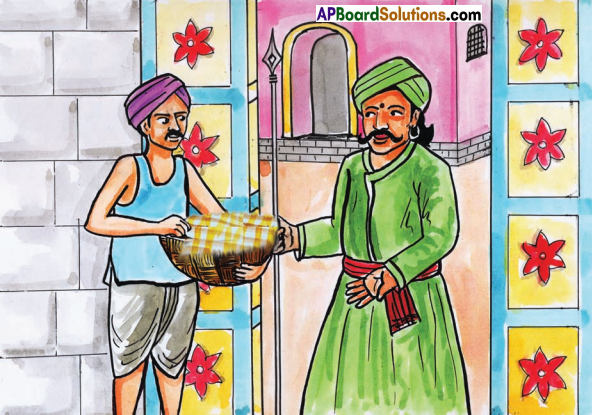
Question 1.
What do you think are the men at the gate?
Answer:
I think one of them is the gatekeeper of the fort (Raja’s palace) and the other is a visitor.
Question 2.
What does the man have in the basket?
Answer:
The man has some gift in the basket.
Question 3.
Why does the gatekeeper stop him at the gate?
Answer:
The gatekeeper stops him at the gate because he wants something from the fisherman.
Question 4.
Why does the man with the basket want to go into the fort?
Answer:
The man with the basket wants to go into the fort (Raja’s palace) to give some gift to the king.
![]()
Oral Discourse:
Question.
Role play – Enact the scene depicted in the above picture.
(Characters; the gatekeeper and the man with the basket.)
Answer:
Gate keeper : Who are you ? Why do you come here?
Man with the basket : I am a fisherman I want to see the Raja.
Gate keeper : Why do you want to see him ?
Man with the basket : I brought a gift to Raja. I want to give it to him.
Gatekeeper : Where is the gift?
Man with the basket : It is in the basket.
Gate keeper : What gift did you bring?
Man with the basket : What gift could a fisherman give except fish !
Gate keeper : you can not go in.
Man with the basket : But I must see the Raja
Gate keeper : ok! Let us come to an agreement. Raja will definitely pay a good price for it. Will you give me half the price?
Man with the basket : I am very poor. How can I do that?
Gate keeper : If you agree to this agreement, I will let you in otherwise. I won’t let you in.
Man with the basket : ok ! I agreed. Let me go in.
Gate keeper : Now, you can go in.
Man with the basket : Thank you very much.
![]()
Comprehension:
I. Choose the correct option to answer each of the following. Write the letters a, b, c, or d in the brackets provided.
Question 1.
What did the fisherman want for his daughter’s marriage? [ ]
(a) time
(b) money
(c) clothes
(d) jewellery
Answer:
(b) money
Question 2.
What advice did the fisherman’s friends give him? [ ]
(a) to see the Raja
(b) to see the Queen
(c) to see the Bank Manager
(d) to see the money lender
Answer:
(a) to see the Raja
Question 3.
What did the fisherman want to take with him? [ ]
(a) his daughter
(b) a gift
(c) his wife
(d) his friends
Answer:
(b) a gift
Question 4.
Who stopped the fisherman at the palace? [ ]
(a) the guard
(b) the soldier
(c) the gatekeeper
(d) the queen’s attendant
Answer:
(c) the gatekeeper
![]()
Question 5.
Why did the gaitekeeper stop the fisherman? [ ]
(a) to get something from the fisherman
(b) his duty was not to allow anyone
(c) fisherman was his enemy
(d) fishermen were not allowed
Answer:
(a) to get something from the fisherman
Question 6.
The gatekeeper asked the fisherman to give him half the reward because …………. [ ]
(a) he was greedy.
(b) he was poor.
(c) he loved money.
(d) he wanted to become rich.
Answer:
(a) he was greedy.
Question 7.
“Stay for the dinner and enjoy it with us.” Why did the speaker say so? [ ]
(a) to honour the guest
(b) to show his hospitality
(c) to show his royalty
(d) to show humanity
Answer:
(a) to honour the guest
Question 8.
“Everybody in the palace must enjoy my gift.” What does this show us of the speaker? [ ]
(a) generosity
(b) ambition
(c) wisdom
(d) selfishness
Answer:
(a) generosity
![]()
II. Answer the following questions :
Question 1.
What are the characters in the story ?
Answer:
The characters in the story are the fisherman, the gatekeeper, the king and the king’s men.
Question 2.
The fisherman’s gift to the Raja was a big fish. Why was it not something else ?
Answer:
The fisherman couldn’t give anything but a fish. So, it was the fish but not something else.
Question 3.
What is your opinion about the gatekeeper ?
Answer:
The gatekeeper was a greedy and selfish man. He was not honest.
Question 4.
If you were the gatekeeper, would you let the fisherman into the palace ?
Answer:
If I were the gatekeeper, I would let the fisherman into the palace without expecting anything from him.
Question 5.
Why did the fisherman ask for 200 lashes on his back ?
Answer:
The fisherman asked for 200 lashes on his back because he wanted to unveil the greedy nature of the gatekeeper.
![]()
Question 6.
What gift would you ask the king, if you were the fisherman ?
Answer:
If I were the fisherman, I would ask the king for a toy aeroplane.
Question 7.
Why did the king want to dismiss the gatekeeper ?
Answer:
The king wanted to dismiss the gatekeeper as he was a greedy and dishonest person.
Question 8.
The king was happy with the fisherman and angry with the gatekeeper at the same time. Why was this so ?
Answer:
The king was happy with the fisherman because he made the king know about his greedy gatekeeper. He was happy with the wisdom of the fisherman. The king was angry with the gatekeeper ar he was greedy and corrupt.
Question 9.
If the Raja did not help the fisherman, what would be the end of the story ?
Answer:
If the Raja did not help the fisherman, the fisherman wouldn’t get his daughter married. In another end, he would get his daughter married if any other person(s) helped him.
III. Rearrange the words in each sentence to make sensible sentences. Then arrange them in the order of occurrence in the story. Make a good paragraph with these sentences using appropriate joining words like, ‘but’, ‘however’, ‘then’, ‘after that’, ‘finally’, etc.
1. went to the king’s/ palace with a gift / the fisherman
2. did not have enough money / for his daughter’s marriage/ the fisherman
3. stopped /the gatekeeper / him –
4. two hundred lashes/the fisherman asked / the Raja to give him
5. promised to get / The Raja / the fisherman’s daughter married
6. on condition / the gatekeeper / allowed / the fisherman / that he would get half the price
7. at the strange request of the fisherman / the Raja was surprised / and knew about the bad gatekeeper
8. from the service/ Raja gave / to the gatekeeper and dismissed him / two hundred lashes
Answer:
The fisherman didn’t have enough money for his daughter’s marriage. So, the fisherman went to the king’s palace with a gift. But the gatekeeper stopped him. However, the fisherman allowed the gatekeeper on condition that he would get half the price. Then the fisherman asked the Raja to give him two hundred lashes. The Raja was surprised at the strange request of the fisherman and knew about the bad gatekeeper. Finally the Raja gave two hundred lashes to the gatekeeper and dismissed him from his service. After that the Raja promised to get the fisherman’s daughter married.
![]()
Vocabulary:
Read the following sentence carefully.
The fisherman placed the fish with great respect at the Raja’s feet.
The underlined word can be replaced with ‘politeness’.’The word ‘politeness’ in the above context gives the same meaning as respect. Words which give the same or nearly the same meaning as other words are called Synonyms.
I. Now read the following passage carefully. Replace the underlined words with other words that have the same meaning.
The King felt ashamed to have a bad servant in his court. He dismissed the servant from the service as he was a cheat. But he praised the fisherman for his wisdom. Finally, the fisherman was successful to find a worthy young man for his daughter. He married off his daughter with the help of the King.
Answer:
- ashamed : humiliated
- dismissed : removed
- cheat : deceiver
- praised : applauded
- wisdom : knowledge
- successul : victorious
II. Read the following passage carefully. You find certain words have been left out. Fill in the blanks with words opposite in meaning for those underlined.
The King _________ the fisherman but _________ the gatekeeper. The bad servant was _________ and the fisherman was rewarded. Thus, the wise fisherman taught a lesson to the _________ gatekeeper with his wisdom.
Answer:
The King liked the fisherman but disliked the gatekeeper. The bad servant was punished and the fisherman was rewarded. Thus, the wise fisherman taught a lesson to the foolish gatekeeper with his wisdom.
![]()
III. Suffix is a letter or a group of letters added at the end of a word to make new words.
e.g. : kind + ness – kindness, colour + ful – colourful.
Add suffix to the root word and form new words. Use the new words in sentences of your own.
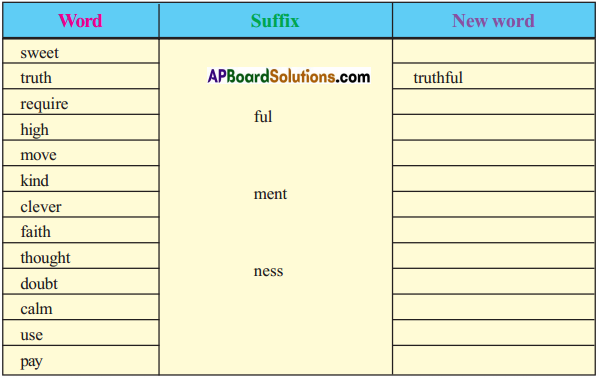
Answer:
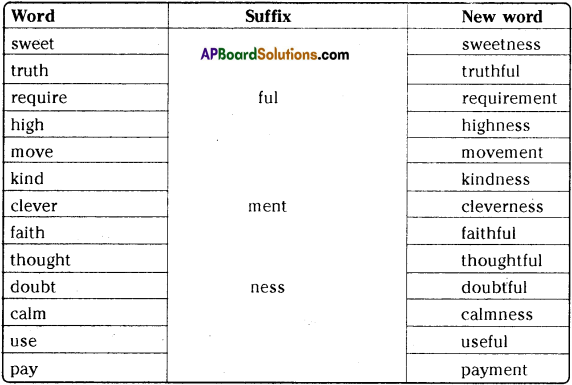
![]()
IV. Words with suffix, “-ing” (present participle)
Read the following sentence from the text and notice the underlined word.
I am getting two hundred lashes from him.
The underlined words in the above paragraph are present participles. They are formed by adding the suffix “-ing”to the verb.
Look at the following and observe the changes in the spellings.
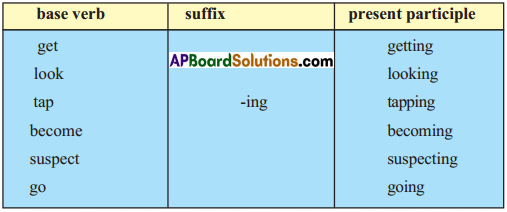
Formulate the rules governing the changes/no changes in the spellings of the present participle for the following base forms of verbs:
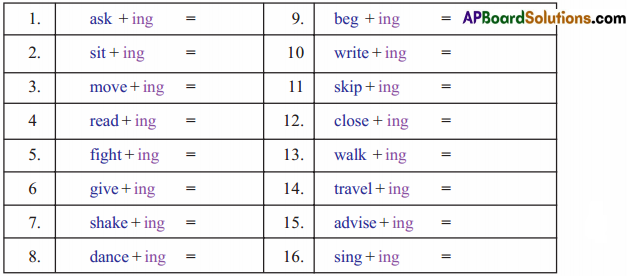
Answer:
1. ask + ing = asking
2. sit + ing = sitting
3. move + ing = moving
4. read + ing = reading
5. fight + ing = fighting
6. give + ing = giving
7. shake + ing = shaking
8. dance + ing = dancing
9. beg + ing = begging
10. write ing = writing
11. skip + ing = skipping
12. close + ing = closing
13. walk + ing = walking
14, travel + ing = travelling
15. advise + ing = advising
16. sing + ing = singing
![]()
Grammar:
1. Use of ‘Must’:
Must’ is used to express necessity, obligation or certainty.
Eg : 1) You must come regularly, (necessity)
2) You must obey your superior’s orders, (obligation)
3) It must be your house, (certainty)
Read the following sentence from the story.
Gatekeeper : I must obey the king’s order. I will not let you in.
In the above sentence, ‘must’ shows some obligation and compulsion. It expresses that the work is to be done without fail.
Give sentences of your own where only must can be used.
Example : You must stop at the traffic light.
1) You mustn’t park your bike here.
2) I must complete the work.
3) This must be your car.
4) You must pass this examination.
5) He must take care of his health.
II. The Simple Present Tense :
The simple present tense is used to say about the following things :
- Habitual actions
- Universal truths
- Near future actions.
Eg:
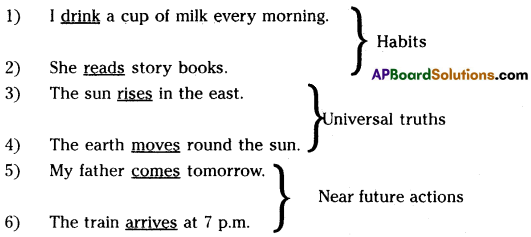
i) Study the routine of a class VI student, Rajesh.
| Time of the day | Activity |
| 1. 5:00 a.m. | gets up from bed |
| 2. 5:15 a.m. | brushes his teeth |
| 3. 5:45 a.m. | takes his bath |
| 4. 6:00 a.m. – 7:30 a.m. | attends to his homework |
| 5. 7:30 a.m. – 7:45 a.m | takes his breakfast |
| 6. 8:00 a.m. | walks to the main road to board the school bus |
| 7. 8:30 a.m. | reaches the school |
| 8. 8:45 a.m. – 4:30 p.m. | attends classes at school |
Questions & Answers :
Question 1.
What time does Rajesh get up?
Answer:
Rajesh gets up at 5:00 a.m.
Question 2.
What does Rajesh do between 6:00 and 7:30 a.m.?
Answer:
Rajesh attends to his homework between 6:00 and 7:30 a.m.
Question 3.
How does Rajesh reach his school?
Answer:
Rajesh reaches his school by bus.
Question 4.
When does Rajesh take his breakfast?
Answer:
Rajesh takes his breakfast between 7:30 a.m. and 7:45 a.m.
Question 5.
How long does Rajesh stay at school?
Answer:
Rajesh stays at school for 7 hours and 45 minutes.
![]()
III. The Present Continuous Tense :
Look at the underlined words in the following passage.
It is 4 pm now. All the children are at play. Raju and his friends are playing Volleyball. Sindu is practising running. The Physical Director (PD) is giving instructions to Kabaddi players. Some girls are watching Tennis. A few boys are drawing lines of Ball badminton court.
The underlined words in the passage above refer to an “action” in progress. That means, it gives an idea that the action is not completed yet, but, is still going on. This is called The Present Continuous Tense.
The Present Continuous Tense is used to denote the actions which are going on at the time of saying / at present. The form of the verb in this tense is
am / is / are + V1 + ing
Eg : 1) Ravi is playing.
2) Sita is dancing.
3) I am driving. – (am + V1 + ing)
4) They are running. – (are + V1 + ing)
Complete the following sentences using present continuous form.
Question 1.
The old man is silent. He _________ on what advice he has to give to the soldiers, (ponder)
Answer:
is pondering
Question 2.
He has not done his homework. He _________ it now. (do)
Answer:
is doing
Question 3.
My shirt is dirty. I _________ it. (wash)
Answer:
am washing
Question 4.
You must carry your umbrella. It _________ heavily, (rain)
Answer:
is raining
Question 5.
Don’t disturb her. She _________ very seriously, (study)
Answer:
is studying
![]()
IV. ‘Wh-’ question words.
Look at the underlined words in the following:
Why can’t you speak to me ?
What shall I do now ?
What is your name, my man ?
The underlined words are called ‘wh-’ words. The other ‘wh-’words are ’where,’ ‘whom,’ ‘which,’ ‘when,’ ‘how’ and ‘why.’ They are used to ask questions.
‘Wh’ words :
- What
- Where
- When
- Which
- Who
- Whom
- Whose
- Why
- How
- How many
- How much
Read the following paragraph and make questions using appropriate wh-words. The first one is done for you.
Dileep and Sindhu are in the class. Sindhu is sitting in the front row. Chandu is reading English but Sindhu is doing exercises. Rajani is sitting in the second row. She is sharpening her pencil carefully. The English teacher is writing on the black board. The children in the front bench are taking down the notes. The children in the back bench are murmuring something. Sunita is going out to drink water.
Example :
1. Where are Dileep and Sindhu ?
Answers :
2. Where is Sindhu sitting ?
3. What is Chandu doing ?
4. What is Sindhu doing ?
5. Where is Rajani sitting ?
6. What is Rajani doing ?
7. What is the English teacher doing ?
8. What are the children in the front bench doing ?
9. What are the children in the back bench doing ?
10. Why is Sunita going out ?
![]()
Editing:
Read the following passage. There is an error in each sentence. Identify and edit it.
Notice Board
- Does not wash your hands in plates.
- Please paying the bill before you leave.
- Saw the menu card before you order.
- Be patient till the food are served.
- Food from outside is no allowed here.
-The housekeeper
Madina Eating House
Answer:
Notice Board
- Do not wash your hands in plates.
- Please pay the bill before you leave.
- See the menu card before you order.
- Be patient till the food is served.
- Food from outside is not allowed here.
-The housekeeper
Madina Eating House
![]()
Writing:
Read the following letter carefully. You notice that it has five main components:
1. station and date
2. salutation
3. body of the letter
4. closing
5. signature (subscription)
6. address on the Envelope
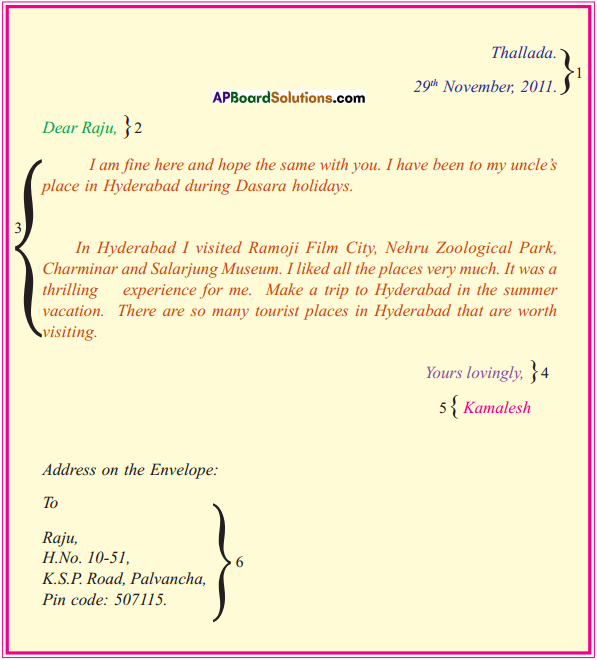
Question 1.
Write a letter to your friend describing a place that you have visited recently.
Answer:
Tummapudi,
20th October, 20xx.
Dear Sindhu,
I am fine here and hope this letter will find you in good cheers. I wrote my quartely examinations very well. What about you ? I have been to my uncle’s place in Mumbai during Dasara holidays.
In Mumbai I visited the Gateway of India, Hanging Gardens, Juhu beach, Elephant caves and Cotton Mills. I liked all the places very much. It was really an amazing experience for me. Make a trip to Mumbai in the summer vacation. There are so many places in Mumbai that are worth visiting.
Yours affectionately,
X X X X.
Address :
T. Sindhu,
H.No. 2-10-1 /A,
Nehru Street,
Bhagatsingh Nagar,
Khammam.
II. Study the following passage carefully. Use capital letters wherever necessary.
rabindranath tagore was one of the greatest poets of 20th century, he was not only a great poet, an artist but also a musician and a reformer, he was the first indian to receive the nobel Prize.
Answer:
Rabindranath Tagore was one of the greatest poets of 20th century. He was not only a great poet, an artist but also a musician and a reformer. He was the first Indian to receive the Nobel Prize.
![]()
Study Skills:
I. Read the following extract from a newspaper.
Green Heaven
My father took me to Wayanad in Kerala for a short trip. It is a wonderful place. This cool and green place is an extreme contrast to my hot and dry native town. Wayanad is a green heaven for me! It is a real feast to eyes !
Now look up a dictionary and list different meanings of the words underlined in the extract. The first one has been done for you.
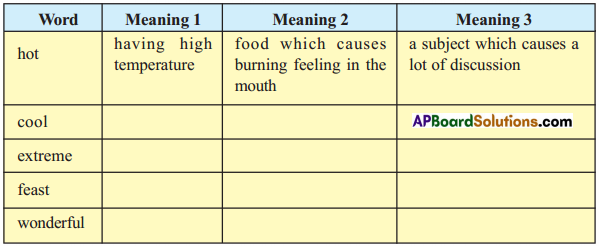
Answer:
| Word | Meaning 1 | Meaning 2 | Meaning 3 |
| hot | having high temperature | food which causes burning feeling in the mouth | a subject which causes a lot of discussion |
| cool | fairly cold | calm | confident |
| extreme | very great in degree | not usual | far from what most people consider to be normal |
| feast | a special meal | a period of time when there is a religious festival | an event that brings great pleasure |
| wonderful | pleasant | remarkable | delightful |
![]()
Listening and Speaking:
I. Listen to the story ‘The Clever Ramalinga’ and answer the following questions:
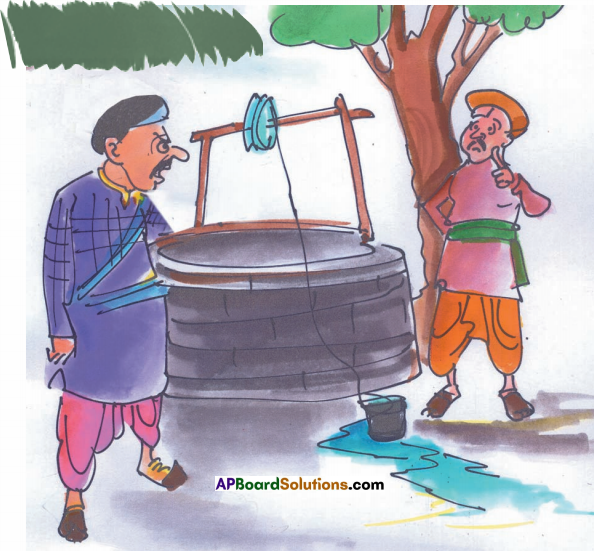
The Clever Ramalinga
Many years ago, there was a poet in the court of Vijayanagar. His name was Ramalinga. He was a very clever man. There are many stories about him. Here is one of them.
Ramalinga’s wife had a lot of jewels. She wore them in the day. At night she put them away, in a box. She kept the box in her bedroom. Ramalinga had two servants. They were rogues. One day, they decided to steal the jewels. One servant said, “We’ll steal the jewels in the night.” The other said, “Yes, in the night, they’ll sleep.
Then we’ll take away the box.” Ramalinga was standing behind them and overheard what they had said. It was dark, so they did not see him.
It was eleven o’clock in the night. The servants went to the bedroom and looked in. Ramalinga and his wife were not asleep. Ramalinga knew that the servants were near. He said loudly to his wife, “There are many thieves in the town. You have a lot of jewels. We must keep them safe. 1 have a plan. We shall put all the jewels in a box. Then we’ll drop the box in the well. Nobody will look there for the jewels.” The servants heard this. “We can now take the jewels easily,” they thought.
Ramalinga quickly took out all the jewels from the box. Then he filled the box with stones. He and his wife took the box out, and dropped it into the well. It. fell into the water with a loud noise. Then Ramalinga and his wife went back into the house.
After some time, the servants went to the well.” How will we take out the box?” one of them asked. “Let’s draw all the water in the well,” the other said. “Then we can take the box out.” They got two buckets and ropes and began to draw the water out. It flowed into the garden. It was a very deep well. It was almost morning. But still there was a lot of water in the well. “Soon it’s going to be morning,” said one servant. “The master will get up soon. So let’s stop working. Weil come back to the well again at night.”
Ramalinga was watching all this. He saw the servants going away. He called them. Then he said, “Thank you for watering the garden. There are no jewels in the box. You are thieves. Get out of here!”
![]()
Choose the right option by writing ‘a’ or ‘b’ or ‘c’ or ‘d’ in the brackets provided.
Question 1.
Ramalinga’s wife had a lot of things. What were they ?
(a) sarees
(b) jewels
(c) books
(d) sweets
Answer:
(b) jewels
Question 2.
Where did Ramalinga’s wife put the jewels at night?
(a) in a box
(b) in an iron safe
(c) in a purse
(d) under the pillow
Answer:
(a) in a box
Question 3.
Who watered the plants?
(a) Ramalinga’s wife
(b) the thieves
(c) Ramalinga himself
(d) the servants
Answer:
(d) the servants
II. Listen to the story again. Say whether the following statements are True or False.
Question 1.
Ramalinga dropped the box of jewels into the well. ( )
Answer:
False
Question 2.
The servants began to draw the water out of the well. ( )
Answer:
True
Question 3.
The servants came again on the next day. ( )
Answer:
False
Question 4.
Ramalinga was angry at the servants. ( )
Answer:
False
Question 5.
The servants lost their jobs. ( )
Answer:
True
![]()
III. Listen to your teacher carefully. Now retell the story to your friend. You may use the following clues. .
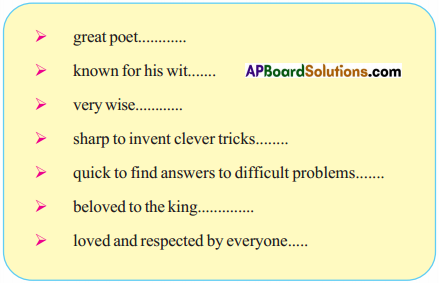
Project:
Collect stories and pictures that reflect wit and humour. Present them before the class. Prepare a grid of such stories for display on the wall magazine. Use the grid and review one or two stories. Use the following format to prepare the grid.
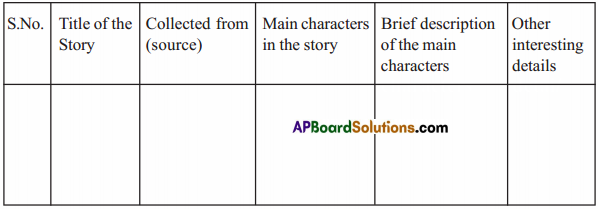
Answer:
| Title of the story | Collected from (source) | Main characters in the story | Brief description of the main characters | Other interesting details |
| 1. The greedy jacked | Panchatantra | Jackal, hillman, wild boar | Hillman shot an arrow to wound wild boar | Wild boar too attacked him and both of them died. Jackal’s greed brought him death. |
| 2. The monkey and the crocodile | Panchatantra | Monkey and crocodile & his wife | Monkey used to give fruit to crocodile. Crocodile’s wife wanted to kill and eat the monkey’s heart. | Finally, the monkey escaped from the trap of the crocodiles with his wisdom. |
Half the Price Summary in English
Once there lived a wise old fisherman in a town near the Arabian sea. He had a daughter. But he did not have any money with him to get her married. His friends advised him to meet the king. So, he caught a very big fish, and went to the king’s palace. There he was stopped by the gatekeeper. He didn’t let the fisherman in. He asked the fisherman to give him half the price the king would give him. The fisherman agreed and went in. He presented the big fish to the king.
The king asked what his name was and when he told that his name was Jalraj, the king told him that he knew that he was the wisest man among the fishermen. He also told that he would respect all gbod and wise men. Then the fisherman told the king that the fish lived below the surface of the water and that, he had caught it for the king. The king felt very happy and asked the fisherman to ask something in return. The fisherman asked for 200 lashes but the king felt that it was a strange request. So, he told him to ask him for something else. But the fisherman wished for only 200 lashes. So, the king ordered his men to give the fisherman what he wanted.
The fisherman requested the king to call his gatekeeper. The king sent for him and he came in. The fisherman then asked the king to give the gatekeeper 100 lashes as per their agreement. The king came to know that the gatekeeper was not honest. He at once removed him from his job and ordered his men to give him all the two hundred lashes. The king told the fisherman that he would give him a good reward for his cleverness and wisdom. Then the fisherman told the king that he wanted to give his daughter away in marriage but he was poor. The king promised him to get his daughter married if he chose the bridegroom.
Glossary:
1) bridegroom (n) : a man on his wedding day or just before or just after it
The bridegroom is a handsome young man.
2) except (pre) : used before you mention the only thing or person about which a statement is not true
All the pupils except Prakash are present.
3) set off (phr.v.) : to begin a journey
Mr. Raj set off his journey to Bengaluru.
4) respect (n) : a feeling of admiration for somebody.
They have great respect for the President.
5) surface (n) : the outside or top layer of something
The surface of this road is very uneven.
![]()
6) whip (n) : a long thin piece of rope or leather
Don’t beat the horse with the whip.
7) lash (n) : a hit with a whp
The servant was given two hundred lashes.
8) dismiss (v) : to remove somebody from his job
Mr. Alexander was dismissed from his job.
9) cheat (v) : to trick somebody or make them believe something which is not true
The financier cheated me.